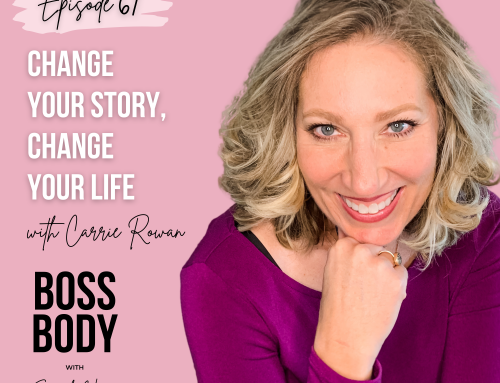Those of you who have been following me for a while know that I have a now 17-year-old son who was diagnosed with type one diabetes when he was six years old. And as you can imagine, as a mom, that was an extremely devastating thing to hear that your child has a disease that’s incurable and that he will have it for the rest of his life. So, as a mom, I threw myself into learning anything and everything I could about nutrition and lifestyle and how to take care of him and his body so that he could live a long, healthy life.
In doing so, I learned so much, and I was able to improve not only his health, but also the health of myself and my entire family. And that was the catalyst that prompted me to go back to school and study integrative nutrition. I realized throughout this process that the changes we made were very doable and realistic.
When I looked around, I saw that so many other women needed the same thing and that what I had learned could help so many people. The other thing that I noticed when I looked around is that I live in East Tennessee, where there’s an extremely high prevalence of type two diabetes, and so many people need the knowledge and the information, and the support to get healthy.
Type One vs. Type Two Diabetes
I want to take just a minute to explain the difference between type one and type two diabetes because they are very different diseases. My son is type one, meaning his body doesn’t produce insulin, and insulin is necessary to live, so he’s on an insulin pump and receives it artificially.
If you have type two diabetes, your body is still producing insulin, but your cells have become resistant to it. Insulin is the hormone in your body that allows glucose from your food to be absorbed into your cells. You’ve probably heard the terms blood sugar and high blood sugar, and you know that has something to do with diabetes, but you’re not sure what. So let me break this down. When you eat food, it gets released into your bloodstream. It gets absorbed into your bloodstream in the form of glucose. And glucose floating around in your blood is what is meant when they say blood sugar.
And when the sugar is circulating throughout your body in your blood, it’s very inflammatory, and that can eventually break down your organs and your systems. And that is why if you continue to have high blood sugar, you end up with heart disease, kidney disease, neuropathy, and blindness. It’s because that sugar damages all of those organs.
So in order for that sugar to not be floating around in your blood and to get absorbed into the cell, you need insulin. The problem is the more insulin you have circulating in your body, the more resistant your cells become to it and, therefore, the more insulin you need. It’s a vicious cycle.
So if you are pre-diabetic or a type two diabetic, this condition will continue to get worse. If you don’t change your diet and your lifestyle, even if you’re on medication or artificial insulin if you continue to put too much sugar in your body, you’ll continue to become more and more resistant to insulin, and the disease will progress.
So let’s talk about how you can reverse this vicious cycle and how you can make your cells more receptive to insulin so that when you eat, the sugar is absorbed easily into your cells and your body functions optimally.
Number One
The first one, as you probably know, is food. And what I mean by that is some foods digest very quickly and release that glucose into your bloodstream, causing you to have high blood sugar and your insulin levels to spike. Which, over time, causes insulin resistance. Or you can eat foods that digest more slowly, which will let you absorb the glucose into your bloodstream and let the insulin take its time so that you don’t get those spikes and it doesn’t cause resistance. Focusing more on those nice lean meats, veggies, and fruits that are full of fiber will go a long way to slowing the digestive process and keeping the blood sugar from spiking.
Number Two
Then the next one is exercise. The reason that exercise helps the sensitivity of your cells is that your muscles have to have glucose. So when you are working your muscles, they are absorbing all that glucose out of your bloodstream. So if you had high blood sugar, it’s going to suck all that sugar right out of your bloodstream so that the muscle can use it for energy.
Number Three
And the third one is reducing stress and getting more sleep. The reason for this is that when you are stressed or tired, your body produces cortisol, which is your stress hormone. That’s your fight-or-flight hormone. Cortisol is what causes the body to react in ways that will give you more energy.
If this is something that you are struggling with, I hope that the information that I shared today will be helpful for you and enable you to take some steps in the direction of getting yourself healthier and happier.






Leave A Comment